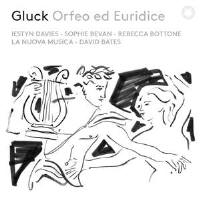Texte paru dans: / Appeared in:
|
|
|
Appréciation d'ensemble / Overall evaluation :
|
|
|
Reviewer: Berta
Joncus
Created in 1762, Christoph
Willibald Gluck’s Orfeo ed Euridice gave 18th-century opera a makeover: instead
of stopping and starting, the action flows continuously; instead of long solos,
numbers are a dense weave of solo, chorus and band; instead of pure opera seria,
Italian and French traditions combine within a score that’s vast, but led by
only three soloists.
Conductor David Bates is, like
Gluck, wonderfully radical. Where other directors smooth over disjunctions, he
revels in rupture: warping standard tempos, switching mood abruptly, releasing
massed forces to wash away solo lines. Recorded at St John’s Smith Square,
London, this live performance has to negotiate the space’s acoustic in real
time, and Bates adjusts gesture to optimise note decay. This is directorship at
its most alert, and aiding Bates is an optimal cast. The qualities of countertenor Iestyn Davies’s voice – warm, rich, yet pure – vivify the particular Orfeo of this opera, one who, because the gods have forbidden him to gaze on his wife, is then accused by her of being unfaithful. Davies radiates Orfeo’s impassioned tenderness, changing vocal colours as the drama demands. Sophie Bevan’s Euridice swings, with blazing bravura and increasing intensity, from anguish to narcissism, lengthening top notes and compressing runs as her thoughts swirl.
Rebecca Bottone
as Amore, who reunites the lovers for a happy ending, captures the cool,
thirdeye view that Gluck hard-wired into the goddess’s rational vocal phrasing
and harmonic progression. It is also thanks to the choir, whose moods register
as loudly as those of the soloists, that this production is a benchmark. It’s
the stuff of Gluck’s dreams. | |
|
|
|
|
|
|
|
Cliquez l'un ou l'autre
bouton pour découvrir bien d'autres critiques de CD |
|




